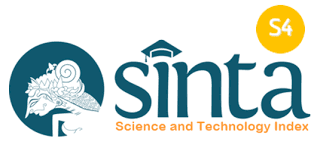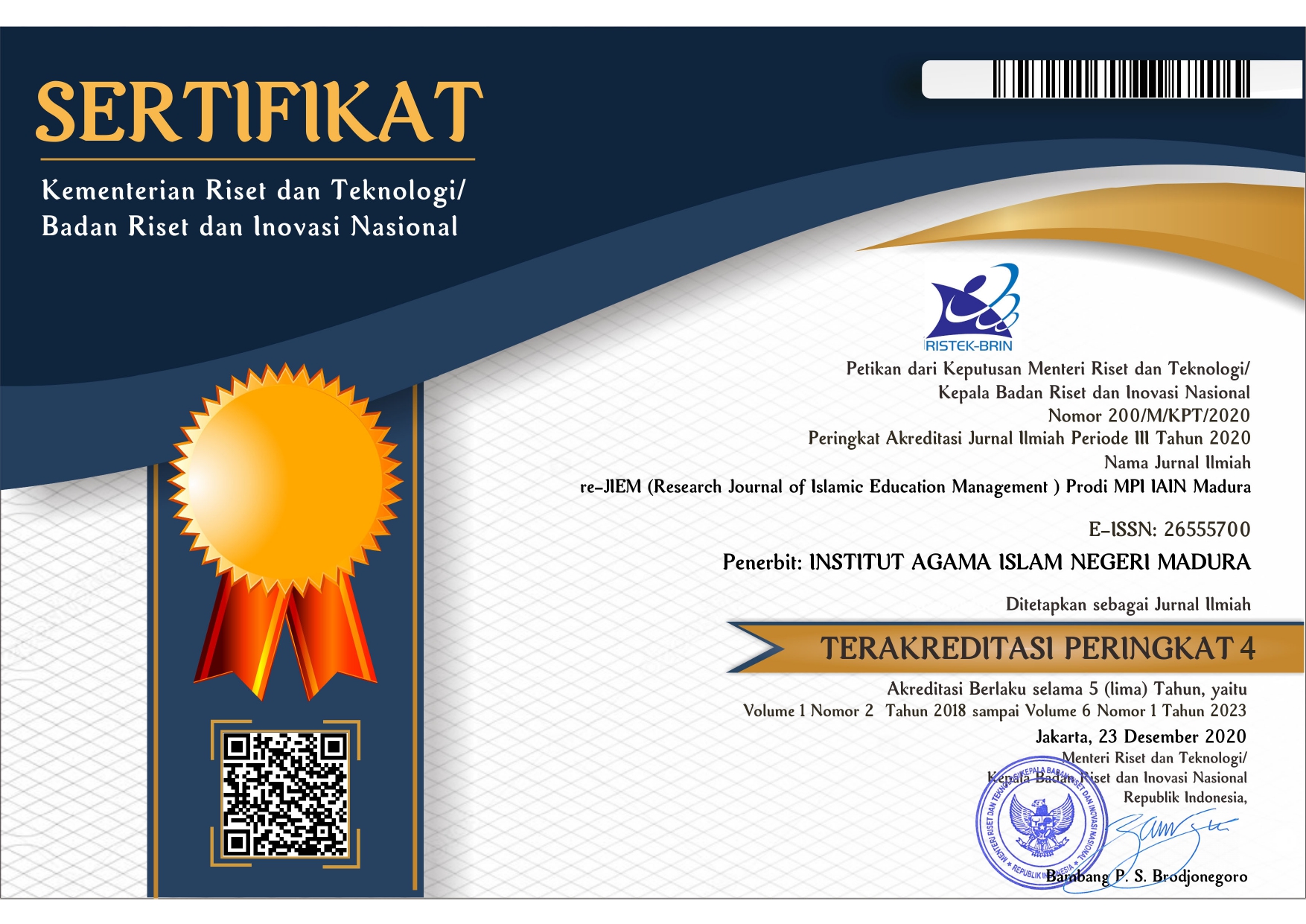MANAJEMEN STRES DI LEMBAGA PENDIDIKAN ISLAM
Studi Mahasiswa Dalam Menghadapi Tugas Akhir Submit Jurnal
 Abstract views: 880
,
Abstract views: 880
,
 PDF downloads: 626
PDF downloads: 626
Abstract
Job demands will cause stress if they cannot be completed on time, especially if the task has not been mastered because, with existing limitations, assignments given by lecturers often affect students psychologically. The method used to conduct this research uses library research while collecting data through related references, both offline and online. The data obtained is then processed to be more complete and up to date. Data analysis uses analysis through various related literature. The results of the analysis show that there is a need for stress management so that it does not tend to be negative, and can be positive for these students, while the causes of stress consist of (1) environmental factors; (2) institutional factors; and (3) personal factors. These factors can be specified according to each condition. The suggestions for these problems include (1) making clear plans, (2) avoiding delays in work and assignments, grouping tasks into several parts, (3) seeking support from people around them, (4) getting enough rest, (5) exercising and good nutrition, (6) use relaxation techniques, and (7) seek professional help when necessary.
Downloads
References
Alawiyah, Faridah. “PERAN GURU DALAM KURIKULUM 2013” 4 (2013).
Amalia, Failasofa, and Tri Nugrahadi. “PENERAPAN MULTILEVEL SURVIVAL ANALYSIS TERHADAP DURASI MENCARI KERJA ANGKATAN KERJA LULUSAN SMK DI INDONESIA TAHUN 2019.” Seminar Nasional Official Statistics 2020, no. 1 (January 5, 2021): 882–91. https://doi.org/10.34123/semnasoffstat.v2020i1.545.
Aryani, Rita, Yudin Citriadin, and Lalu Muhamad Ismail. “MODEL PENANGGULANGAN MANAJEMEN STRES KERJA PADA LINGKUNGAN PENDIDIKAN.” Fitrah: Jurnal Studi Pendidikan 11, no. 2 (December 31, 2020): 1–10. https://doi.org/10.47625/fitrah.v11i2.279.
Audina, Vika, and Tatang Kusmayadi. “PENGARUH JOB INSECURITY DAN JOB STRESS TERHADAP TURNOVER INTENTION (Studi Pada Staff Industri Farmasi Lucas Group Bandung),” no. 1 (2018).
Az-Zahra, Rizka, and Dahliana Abd. “Jurnal Ilmiah Mahasiswa Bimbingan dan Konseling Volume 4 Nomor 4 tahun 2019 Hal 46 - 52 Desember 2019,” n.d.
Darmadi, Hamid. “TUGAS, PERAN, KOMPETENSI, DAN TANGGUNG JAWAB MENJADI GURU PROFESIONAL” 13, no. 2 (2015).
“EFEKTIFITAS PELATIHAN MANAJEMEN STRES PADA.Pdf,” n.d.
Ellong, TD. Abeng. “Manajemen Sarana dan Prasarana di Lembaga Pendidikan Islam.” Jurnal Ilmiah Iqra’ 11, no. 1 (February 25, 2018). https://doi.org/10.30984/jii.v11i1.574.
Gamayanti, Witrin. “Gambaran Penerimaan Diri (Self-Acceptance) pada Orang yang Mengalami Skizofrenia.” Psympathic : Jurnal Ilmiah Psikologi 3, no. 1 (December 27, 2016): 139–52. https://doi.org/10.15575/psy.v3i1.1100.
Hadi, Rauf Iskandar, and Haposan Simatupang. “IMPLEMENTASI UNDANG-UNDANG REPUBLIK INDONESIA NOMOR 14 TAHUN 2005 TENTANG GURU DAN DOSEN (STUDI KASUS KOMPETENSI TENAGA PENDIDIK DI WING PENDIDIKAN TEKNIK DAN PEMBEKALAN KALIJATI DALAM MEMPERSIAPKAN SUMBER DAYA MANUSIA PERTAHANAN TNI AU TAHUN 2017),” n.d.
Haholongan, Rutinaias. “STRES KERJA, LINGKUNGAN KERJA TERHADAP TURNOVER INTENTION PERUSAHAAN.” Jurnal Manajemen Indonesia 18, no. 1 (April 27, 2018). https://doi.org/10.25124/jmi.v18i1.1260.
Handono, Oki Tri, and Khoiruddin Bashori. “HUBUNGAN ANTARA PENYESUAIAN DIRI DAN DUKUNGAN SOSIAL TERHADAP STRES LINGKUNGAN PADA SANTRI BARU.” Empathy : Jurnal Fakultas Psikologi 1, no. 2 (November 12, 2015): 79. https://doi.org/10.12928/empathy.v1i2.3005.
Herlina, Lina. “KONDISI DAN FAKTOR PENYEBAB STRES KERJA PADA KARYAWAN WANITA PT ‘SGS,’” n.d.
Hernawati, Wati. “PENGARUH LINGKUNGAN KERJA DAN KREATIVITAS TERHADAP STRES GURU SMA NEGERI SUB RAYON 1 KOTA BEKASI.” Jurnal Manajemen Pendidikan 4, no. 2 (December 1, 2013). https://doi.org/10.21009/jmp.v4i2.2085.
Huda, Muh Nurul. “TRANSFORMASI LEMBAGA PENDIDIKAN ISLAM DALAM MENINGKATKAN DAYA SAING,” n.d.
Ilham, Dodi. “Menggagas Pendidikan Nilai dalam Sistem Pendidikan Nasional” 8, no. 3 (2019).
Irvianti, Laksmi Sito Dwi, and Renno Eka Verina. “Analisis Pengaruh Stres Kerja, Beban Kerja dan Lingkungan Kerja terhadap Turnover Intention Karyawan pada PT XL Axiata Tbk Jakarta.” Binus Business Review 6, no. 1 (May 29, 2015): 117. https://doi.org/10.21512/bbr.v6i1.995.
Kholidah, Enik Nur. “Berpikir Positif untuk Menurunkan Stres Psikologis.” JURNAL PSIKOLOGI, n.d.
Kirschbaum, Clemens, Karl-Martin Pirke, and Dirk H. Hellhammer. “The ‘Trier Social Stress Test’ – A Tool for Investigating Psychobiological Stress Responses in a Laboratory Setting.” Neuropsychobiology 28, no. 1–2 (1993): 76–81. https://doi.org/10.1159/000119004.
Kunci, Kata. “Social Factors Affecting Job Stress,” n.d.
Kusnadi, Miqdad Arats. “HUBUNGAN ANTARA BEBAN KERJA DAN SELF-EFFICACY DENGAN STRES KERJA PADA DOSEN UNIVERSITAS X,” 2014.
Maisa, Esthika Ariany, Andrial Andrial, Dewi Murni, and Sidaria Sidaria. “Hubungan Stres Akademik dengan Kualitas Tidur Mahasiswa Keperawatan Tingkat Akhir Program Alih Jenjang.” Jurnal Ilmiah Universitas Batanghari Jambi 21, no. 1 (February 10, 2021): 438. https://doi.org/10.33087/jiubj.v21i1.1345.
“MOTIVASI MAHASISWA BPI DALAM MENGERJAKAN.Pdf,” n.d.
Muhamad Khoirul Umam. “Lembaga Pendidikan Islam Dalam Telaah Lingkungan Strategik.” Jurnal Tinta 1, no. 2 (September 1, 2019): 16–29. https://doi.org/10.35897/jurnaltinta.v1i2.196.
Muslim, Moh. “MANAJEMEN STRESS PADA MASA PANDEMI COVID-19” 23, no. 2 (2020).
Nataria, Octavia, Selmi Dedi, and Margareth Sylvia Sabarofek. “PENGARUH STRES KERJA DAN BEBAN KERJA TERHADAP KINERJA PEGAWAI DISPERINDAGKOP DAN UMKM MANOKWARI.” Cakrawala Management Business Journal 1, no. 1 (July 4, 2019): 67. https://doi.org/10.30862/cm-bj.v1i1.5.
Nurcahyani, Istiana, and Lutfi Fauzan. “EFEKTIVITAS TEKNIK RELAKSASI DALAM KONSELING KELOMPOK BEHAVIORAL UNTUK MENURUNKAN STRES BELAJAR SISWA SMA.” Jurnal Kajian Bimbingan dan Konseling 1, no. 1 (March 3, 2016): 1–6. https://doi.org/10.17977/um001v1i12016p001.
Nurdiawati, Ela, and Nina Atiatunnisa. “Hubungan Stres Kerja Fisiologis, Psikologis dan Perilaku Dengan Kinerja Karyawan,” 2018.
Nurmalasari, Ita, and Dewi Zainul Karimah. “PERAN MANAJEMEN SDM DALAM LEMBAGA PENDIDIKAN UNTUK MENINGKATKAN MUTU PENDIDIK” 2, no. 1 (2020).
Pasiska, Pasiska, Mutyati Mutyati, and Rabial Kanada. “Pelaksanaan Rekrutmen Tenaga Pendidik dan Kependidikan di Sekolah Dasar Islam Terpadu Lan Tabur Kota Pagar Alam.” El-Idare: Jurnal Manajemen Pendidikan Islam 6, no. 2 (January 1, 1970): 85–96. https://doi.org/10.19109/elidare.v6i2.6465.
Patiallo, Daniel. “Evaluasi Pelaksanaan Pembelajaran Inklusif di SD Kristen Malango’ Tagari Kabupaten Toraja Utara” 5 (2021).
“PENGARUH BEBAN KERJA DAN EFIKASI DIRI TERHADAP.Pdf,” n.d.
“Perbedaan Stres Ditinjau Dari.Pdf,” n.d.
Prayatna, Agus Heri, and Made Subudi. “PENGARUH GAYA KEPEMIMPINAN TERHADAP STRES KERJA DAN KEPUASAN KERJA KARYAWAN PADA FAVE HOTEL SEMINYAK” 5, no. 2 (n.d.).
Priatmoko, Sigit. “MEMPERKUAT EKSISTENSI PENDIDIKAN ISLAM DI ERA 4.0,” 2018.
Purwanto, Budi, Ivon Arisanti, and Ayuning Atmasari. “HUBUNGAN PERNIKAHAN JARAK JAUH (LONG DISTANCE MARRIAGE) DENGAN STRES KERJA PADA KARYAWAN PT WIJAYA KARYA (PERSERO) TBK (PROYEK PEMBANGKIT LISTRIK TENAGA MESIN GAS 50 MW SUMBAWA)” 1 (2018).
Putri, Desy Kirana Sari. “PENGALAMAN MENYELESAIKAN SKRIPSI: STUDI FENOMENOLOGIS PADA MAHASISWA PSIKOLOGI UNIVERSITAS NEGERI SURABAYA” 02 (2013).
Rinta, Anggi Sirka, Dike Febriana, and Retno Wulandari. “STRATEGI PENGELOLAAN PEMASARAN PENDIDIKAN ANAK USIA DINI,” n.d.
Rusilowati, Umi. “PRAKTEK MANAJEMEN SUMBER DAYA MANUSIA SELAMA PANDEMI COVID-19 PADA KARYAWAN YANG BERGERAK DI SEKTOR FORMAL DI INDONESIA” 4, no. 2 (2020).
Rustiana, Eunike R, and Widya Hary Cahyati. “STRESS KERJA DENGAN PEMILIHAN STRATEGI COPING,” 2012.
Sanjaya, Putu. “PENTINGNYA MOTIVASI INTRINSIK DALAM PEMBELAJARAN PENDIDIKAN AGAMA HINDU” 1, no. 2 (2020).
Santika, I Gusti Ngurah. “KEPALA SEKOLAH DALAM KONSEP KEPEMIMPINAN PENDIDIKAN: SUATU KAJIAN TEORITIS,” no. 2085 (2017).
Sari, Permata, Siti Zahra Bulantika, Ferisa Prasetyaning Utami, and Farid Imam Kholidin. “Pengaruh Manajemen Stress dan Kelola Emosi Terhadap Tingkat Kecemasan Siswa di Masa New Normal.” Bulletin of Counseling and Psychotherapy 2, no. 2 (September 9, 2020): 62–67. https://doi.org/10.51214/bocp.v2i2.44.
Setyani, Iin. “Manajemen Stres Menghadapi Covid-19 Dalam Pendidikan Islam.” Cakrawala: Jurnal Manajemen Pendidikan Islam dan studi sosial 5, no. 1 (July 7, 2021): 51–70. https://doi.org/10.33507/cakrawala.v5i1.216.
Sinaga, Maria Tiahohu, and HP Sunardi. “ANALISIS PENGARUH STRES KERJA TERHADAP PRESTASI KERJA KARYAWAN PADA PT BARDIE PURITAMA” 13, no. 2 (n.d.).
“Skripsi Rizky Ramadhan Marpaung.Pdf,” n.d.
Subchanifa, Dian Pujiatma Vera, and Nugraheni Istiqomah. “Stres Kerja, Kompetensi, Kompensasi dan Pengaruhnya Terhadap Kinerja Karyawan dengan Motivasi Sebagai Variabel Intervening TAHUN 2015–2018,” n.d.
Suryani, Ni Kadek, and Gede Agus Dian Maha Yoga. “KONFLIK DAN STRES KERJA DALAM ORGANISASI.” WIDYA MANAJEMEN 1, no. 1 (November 12, 2018): 99–113. https://doi.org/10.32795/widyamanajemen.v1i1.209.
Suwuh, Rendy, Odi R Pinontoan, and Diana Vanda D Doda. “GAMBARAN KEPUASAN KERJA DAN MOTIVASI KERJA PADA GURU GURU DI SMP KRISTEN TATELI KECAMATAN MANDOLANG KABUPATEN MINAHASA,” n.d.
Wahyono, Imam. “MENGEMBANGKAN IKLIM ORGANISASI DI SEKOLAH DENGAN MENGGUNAKAN MODEL TAGIURI.” AL-TANZIM : JURNAL MANAJEMEN PENDIDIKAN ISLAM 3, no. 2 (October 29, 2019): 61–72. https://doi.org/10.33650/al-tanzim.v3i2.638.
Wakhid, Abdul, Endang Budiati, and Fitria Rahmadani. “Faktor Faktor Yang Berhubungan Dengan Stres Kerja Customer Service Di PT Telekomunikasi Indonesia,Tbk Lampung Tahun 2019” 1, no. 1 (2020).
Widyastuti, Nova, and Edy Rahardja. “ANALISIS PENGARUH STRES KERJA, KOMPENSASI, DAN EMPLOYEE ENGAGEMENT TERHADAP KINERJA PEGAWAI,” n.d.
Copyright (c) 2022 Muh. Ibnu Sholeh dan Sulistyorini

This work is licensed under a Creative Commons Attribution-ShareAlike 4.0 International License.
Authors who publish with this journal agree to the following terms:
Authors retain copyright and grant the journal right of first publication with the work simultaneously licensed under a Creative Commons Attribution-ShareAlike 4.0 International License that allows others to copy and redistribute the material in any medium or format with an acknowledgment of the work's authorship and initial publication in this journal and also allows to remix, transform, and build upon the material for any purpose, even commercially with contributions under the same license as the original.
Authors are able to enter into separate, additional contractual arrangements for the non-exclusive distribution of the journal's published version of the work (e.g., post it to an institutional repository or publish it in a book), with an acknowledgment of its initial publication in this journal.
Authors are permitted and encouraged to post their work online (e.g., in institutional repositories or on their website) prior to and during the submission process, as it can lead to productive exchanges, as well as earlier and greater citation of published work.



























